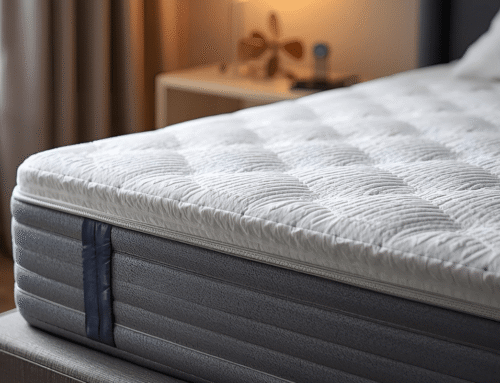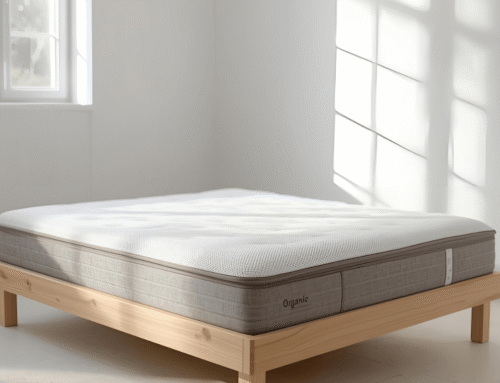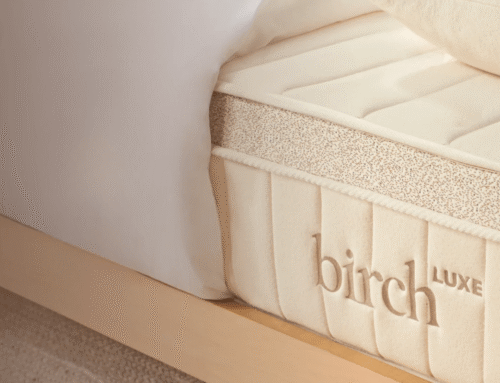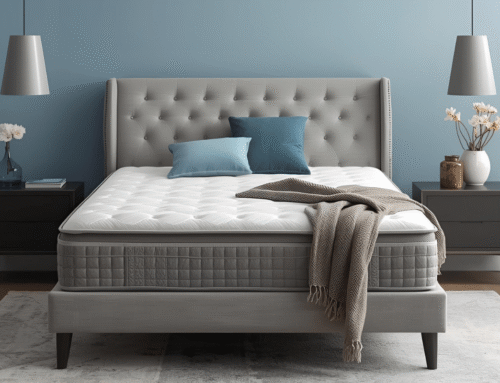Looking for that “ahhh” feeling when you lie down? Then let’s talk about what a plush mattress is. It is a soft, cloud-like bed that hugs your body while still giving gentle support. If you’ve ever wondered what plush mean in mattress firmness or whether it’s just marketing fluff, it’s actually a real thing. Plush mattresses are known for cozy comfort without making you feel stuck or sinking too deep. It has the perfect balance that many sleepers fall in love with. Curious how firm is a plush mattress?
If you’re someone who wants a soft sleep surface but still needs a bit of support underneath, this could be your dream bed. Not too squishy, not too stiff… just right. For people who crave that blend, discovering the perfect balance of plush firm mattress might also be worth exploring.
In this post, I’ll help you understand the plush mattress definition, explore and explain what a plush mattress is good for, especially for specific sleep styles and pain points. Whether you’re new to mattress shopping or stuck between options like plush or medium mattresses, this guide is made to be super easy to understand and full of practical tips you can use right away.
Key Takeaways
- A plush mattress offers a soft, cushioned feel, ideal for side sleepers and those seeking pressure relief on hips and shoulders.
- Typically rated 3–4 on the firmness scale, plush mattresses provide a gentle “sink-in” sensation without compromising spinal alignment.
- Plush mattresses are best suited for lighter individuals and side sleepers; back and stomach sleepers may require firmer support.
- Push mattresses differ from pillow tops; plush has integrated cushioning, while pillow tops add an extra layer on the surface.
- To firm up a plush mattress, consider adding a firm topper, using a solid base, or adjusting room temperature to enhance support.
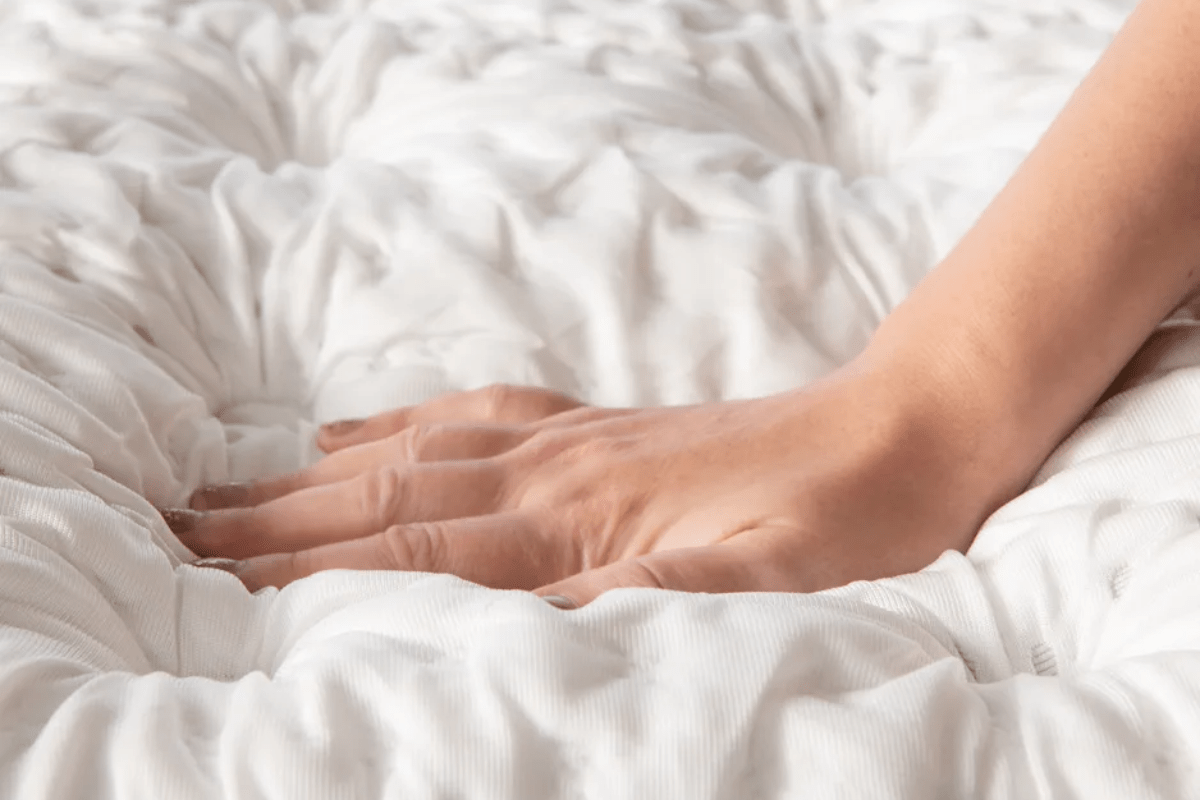
What Does a Plush Mattress Feel Like?
If you’ve ever melted into a pile of pillows or snuggled into a thick, fluffy comforter, you already kinda get the idea. A plush mattress feels soft and cushiony, with just the right amount of “sink.” It cradles your body gently, especially around your shoulders and hips, making it a dream for side sleepers.
But it’s not all fluff because there’s still structure underneath. A plush mattress doesn’t swallow you whole like an ultra-soft one might and if you’re looking for next-level plushness, there’s a whole world of ultra plush mattresses out there. But be warned: it’s not for everyone, especially if you need a firmer support system. We break that down further in ultra plush and medium options to help you decide if extra softness is really your thing
Common Materials in Plush Mattresses
So, what makes a mattress feel plush? It all comes down to the materials layered inside. Most plush beds use:
- Memory foam (for that deep-contouring hug)
- Latex (for a slightly bouncier but still soft feel)
- Pillow-top layers (extra cushioning stacked on top)
A plush hybrid mattress is also a popular choice, blending the softness of foam with the support of coils. These hybrid designs give you the best of both worlds: that cozy, cloud-like top with a solid, responsive base underneath.
Still trying to figure out which type suits you best? You’re not alone. Many people find themselves debating plush vs pillow top mattresses, and honestly, it’s an easy mix-up. They’re both comfy, but there are some key differences—knowing them can really help you make the right pick.
Signs You Might Need a Plush Mattress
Not sure if plush is for you? Here are a few signs it might be time to switch:
- You wake up with sore shoulders or hips
- You mostly sleep on your side or back
- Your current mattress feels too stiff
- You crave that hotel-bed softness
If you’ve been wondering why your new plush mattress is hard, it might just need some breaking in. Or you may have ended up with a medium-firm mattress by mistake.
Testing If Plush Is Your Perfect Match
You’ve read all about the benefits, but how do you really know if a plush mattress is right for you? The best way is to test it out. If you’re shopping in-store, take your time. Spend at least 10 to 15 minutes lying on a plush model. Try out your favorite sleep positions, see how your body feels, and pay attention to whether your pressure points are supported and your spine stays aligned.
If you’re buying online, don’t stress. Look for a brand that offers a generous sleep trial. That way, you can test the mattress in your own space and send it back if it doesn’t feel quite right. Not loving the softness? Don’t worry, it’s a common issue. You can actually learn how to make a plush mattress firmer with a few simple tricks, like adding a firmer topper or adjusting your bed base. Comfort is always customizable.
Not All Soft Beds Are Created Equal
Think all plush mattresses feel the same? Not quite. While they’re all designed to offer softness and comfort, the feel can vary a lot depending on materials, construction, and support layers. And if you’re torn between a plush mattress and something firmer, you’re definitely not alone.
Some people love sinking into that cozy, cloud-like surface, while others prefer the solid, no-nonsense support of a firm bed. That’s why it’s important to know what sets them apart. Understanding the 5 key differences between plush vs firm mattress types can really help you figure out which one matches your sleep style best.
Things like pressure relief, motion isolation, edge support, and even temperature control can feel completely different depending on the firmness level. So before you buy, take a little time to compare. Your back (and your sleep) will thank you for it.

When Medium Isn’t “Just Right” Anymore
If your current mattress feels like a compromise—just kind of “meh”—you’re not alone. A lot of sleepers land in that middle ground where a medium mattress feels okay but not exactly dreamy. Maybe you wake up with slight aches, or you’re just not getting that cozy, cradled feeling you really want at the end of the day.
That’s where the comparison between plush and medium mattress comes in. It’s not just about softness, it’s about how well your mattress supports your body, aligns your spine, and relieves pressure.
If medium feels too firm or not quite comforting enough, a plush mattress might be the upgrade you’ve been missing. On the flip side, if plush sounds too soft, sticking with medium might still be your sweet spot. Either way, knowing the difference helps you make a smarter, more comfortable choice.
Your Ideal Mattress Might Not Be What You Think
You’ve probably heard that a firm mattress means better support but that’s only part of the story. The truth is, the right comfort level depends on more than just firmness. Your sleep position, how much pressure relief you need, and even your body type all play a role in what’s actually going to feel good night after night.
Some people thrive on a firm surface, while others need something softer to cushion their joints and ease tension. That’s why choosing the right mattress isn’t always straightforward. If you’re unsure where to start, our guide on plush or firm mattress: how to choose the right comfort level walks you through the key factors that matter most.
Because at the end of the day, your mattress should feel like it was made for you—not just a one-size-fits-all fix. The more in tune you are with your comfort needs, the better your sleep will be.
The Word “Plush” Gets Thrown Around A Lot
“Plush” does sound luxurious, but what does it actually mean when it comes to your mattress? Is it genuinely soft, or just another marketing term that doesn’t say much? If you’ve ever found yourself lying on a “plush” mattress in a store and wondering why it still feels kind of firm, you’re not alone.
The truth is, a plush mattress is soft, but softness can vary depending on the materials and construction. Some offer a deep, sink-in feel, while others are more cushiony on top but still supportive underneath. It’s all about balance.
Soft Support That’s Still Structured
You don’t have to pick between that sink-in, melt-away softness and the solid support your body needs. There’s a sweet spot where comfort and structure meet, and that’s where plush and medium-firm mattresses come in. They offer cushioning without making you feel like you’re stuck in quicksand.
But here’s where things can get a little confusing: what’s the real difference between plush and soft? Are they the same thing, or is there more to it? Our breakdown of plush vs soft mattress clears up the mix-up so you know exactly what to expect in terms of feel and support.
We also dive into plush vs medium firm mattress comparisons to help you figure out what your body actually needs—more cushion, more lift, or a bit of both. Because when it comes to great sleep, it’s not just about softness, it’s about finding that just-right balance.
So… How Plush Is Too Plush?
There’s plush and then there’s ultra plush. And yes, the difference matters. While both aim to deliver that soft, cradling comfort, plush vs ultra plush mattress and plush vs medium firm options vary in how deeply you sink and how much support you still feel underneath. Ultra plush tends to have more cushioning layers, which can feel amazing… until you realize it’s a little too soft for your liking.
If you want that cozy softness without sacrificing support, it’s important to know where each type stands. That’s where understanding the difference between plush, medium and firm mattresses comes into play. These categories aren’t just labels—they impact how your body is supported throughout the night.
Whether you’re drawn to a softer sleep surface or need something a bit more structured, getting clear on these differences will help you choose a mattress that feels just right—not too hard, not too soft, and definitely not like quicksand.



